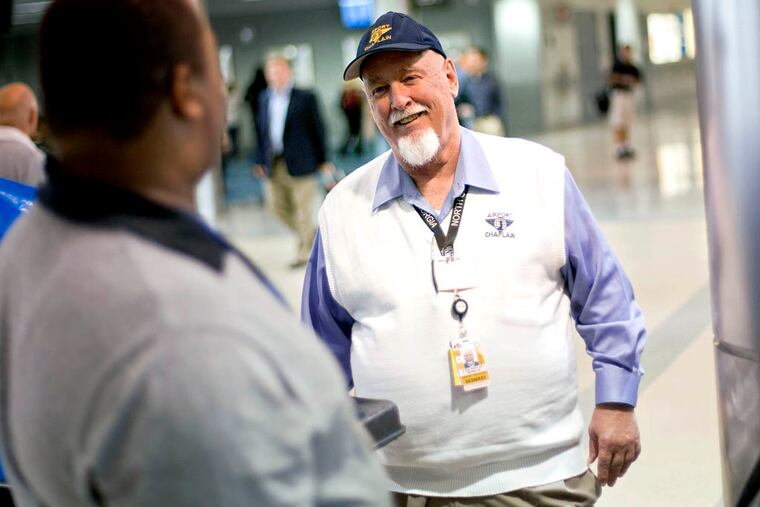Wings and a prayer: Airport chapels
The Rev. Frank Colladay Jr.'s parish happens to be the world's busiest airport: Hartsfield-Jackson International in Atlanta.

ATLANTA - The Rev. Frank Colladay Jr.'s parish happens to be the world's busiest airport: Hartsfield-Jackson International in Atlanta. His flock consists of people passing through who might need comfort, spiritual advice, or someone to pray with.
Linda Gilbert had a greater need than most. After her husband died of a heart attack on a flight, Colladay was waiting at the gate when Gilbert arrived, on a different flight, for the devastating task of arranging to bring his body home.
Colladay guided her through the airport, drove her in his silver Ford Fusion to the medical examiner to visit her husband's body and arranged for a flight home for both of them.
"He didn't say a whole lot. But just his presence being there, it just felt comforting and reassuring," Gilbert says. "I didn't know that airports have chaplains."
Most people don't.
Airports are mini-cities with their own movie theaters, fire departments and shopping malls. Many also have chapels, typically tiny nondenominational spaces.
These airport chapels offer an escape from constant gate change and security announcements and are staffed by 350 part- and full-time chaplains worldwide - Roman Catholic, Protestant and, to a lesser extent, Jewish, Muslim or Sikh.
Even those who know the chapels exist sometimes can't find them. They are tucked away in odd corners of the airport: next to baggage claim in St. Louis, sandwiched between two tram stations in Orlando and above a Cinnabon and barbecue joint in Charlotte, N.C. "Can you imagine the smells we're getting?" says Ben Wenning, a Roman Catholic deacon there.
Tending a flock on wing
An airport chaplain's job is unlike other church assignments. There isn't a permanent congregation. No baptisms, weddings or funerals. Instead, airport chaplains preach to a crowd that is transient by nature.
Trust must be earned quickly. Everybody is rushing to catch a flight. "You only get one chance to impress them; one chance to help them," says Bishop D.D. Hayes, a nondenominational pastor at Dallas-Fort Worth International Airport. "Many times, we touch lives we never see again."
There are daily or weekly services, but most ministering occurs elsewhere.
Chaplains see troops off to war and are on hand when bodies of the fallen return. They comfort fliers visiting sick relatives and those traveling for medical treatment themselves. During weather delays, chaplains take the heat off gate agents by standing nearby - passengers tend to be on their best behavior when in the presence of a priest. (Surprisingly few passengers confess to a fear of flying.)
Often, the chaplains just roam terminals offering a friendly face and occasional directions. Some walk up to 7 miles a day.
"When I came into the job, my predecessor said you have to buy good shoes," says the Rev. Jean-Pierre Dassonville, a Protestant who just retired after 12 years at Charles De Gaulle Airport in Paris.
Heaven's own TSA
Chaplains have to recognize the signs that something is wrong and know how to approach strangers. The Rev. Wina Hordijk, a Protestant minister at Amsterdam's Schiphol Airport, recently saw a teenage girl sitting alone, crying. Her boyfriend had dumped her at the start of a trip across Europe.
"I always have a lot of handkerchiefs in my bag," Hordijk says.
It's not just fliers who the chaplains support; there are also thousands of airport workers. For those who work Sundays, the airport chapel becomes their de facto church.
"You come into a chapel, you know you're in God's house," says Vibert Edwards, who prays daily before starting his shift as a baggage handler at New York's John F. Kennedy International Airport.
Wherever you go, there they are
The first airport chapel was founded at Boston's Logan International Airport in 1954. Today there are chapels as far away as Geneva, Istanbul and Bangkok. There is not one at Philadelphia International right now, although an airport spokeswoman says it's under discussion.
Catholic dioceses assign - and pay - for priests at larger airports. In some cases, airports or airlines will provide financial support. Many chaplains are volunteers.
Services are quick and informal. As flights near boarding, worshippers duck out. Attracting congregants in the first place can be tricky.
"We sometimes have to reach out to people who have no idea we exist," says the Rev. Chris Piasta, a Catholic priest at JFK's Our Lady of the Skies Chapel, home to a statue of Mary standing on a propeller.
JFK is one of the few airports with separate chapels for each religion. Most airports share nondenominational spaces. Bookshelves are stocked with texts of all religions, often in multiple languages.
Within the clergy, airport postings are in high demand. The job typically doesn't open up until an existing chaplain dies. And even after death, some chaplains remain close to the airport.
When the Rev. Peter Holloway, an Anglican priest at Australia's Melbourne airport, died in June at age 91, he was buried in a cemetery directly below the landing approach to Runway 16.